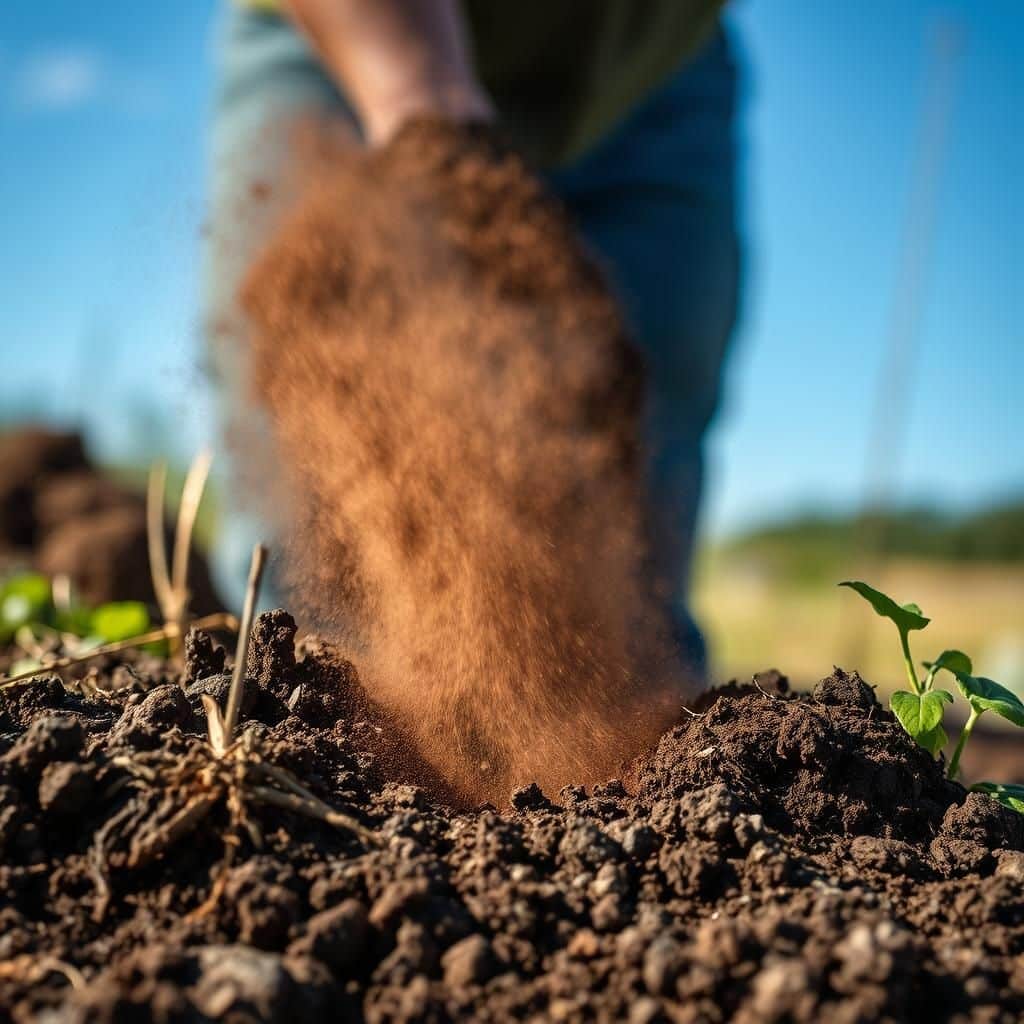What Happens If You Don't Turn Your Compost? Discover the Consequences and Solutions

Composting is an eco-friendly way to recycle organic waste and enrich the soil, but neglecting to turn your compost pile can lead to significant issues. This article explores the consequences of failing to aerate your compost, including odors, slow decomposition, and nutrient loss. By understanding the importance of turning your compost, you can prevent these problems and maintain a healthy composting system. Additionally, we will discuss practical solutions for improving your compost management and ensuring that it remains effective and beneficial for your gardening or landscaping needs. Dive in to discover how to keep your compost thriving!
Consequences of Not Turning Your Compost
Failing to turn your compost can lead to several detrimental effects on the composting process. When compost is not aerated through regular turning, it can become compacted and anaerobic, promoting the growth of harmful bacteria instead of the beneficial microorganisms needed for effective decomposition. This can result in foul odors due to the buildup of methane and other gases, decreased nutrient availability, and a much longer processing time for the materials to break down, ultimately producing a less effective compost product. Additionally, without turning, it becomes challenging to maintain a consistent temperature within the compost pile, hindering the breakdown of organic matter and potentially leading to the survival of pathogens and weed seeds.
Reduced Aeration
Not turning your compost results in reduced aeration, which is vital for the survival of aerobic microorganisms that decompose organic materials. Adequate oxygen levels facilitate the breakdown of materials, allowing for a more efficient composting process, while a lack of aeration fuels the growth of anaerobic bacteria that produce unpleasant odors and lower the compost quality.
Increased Odors
A compost pile that is not regularly turned can accumulate odors due to the production of methane and other gases by anaerobic bacteria. These foul smells can attract pests and indicate that the compost is not decomposing correctly, making it less effective for use in gardens and landscapes.
Longer Decomposition Time
Without regular turning, the decomposition process can take significantly longer, as materials are not adequately mixed and aerated. This can lead to delayed nutrient release, meaning the compost will take more time to be ready for application in gardens, affecting overall gardening schedules and plant health.
Potential for Pathogens and Weeds
When compost is not turned, it may fail to reach the high temperatures necessary to kill off pathogens and weed seeds. Inadequately processed compost can introduce these unwanted elements into your garden, which can lead to plant diseases or invasive weed growth, undermining the benefits that composting typically provides.
Pest Attraction
Unturned compost can become a breeding ground for pests, such as flies and rodents, attracted by the odors and the decaying material. Furthermore, the anaerobic conditions can create a hospitable environment for unwanted organisms, which can invade your garden and disrupt the balance of beneficial insects.
| Issue | Description |
|---|---|
| Reduced Aeration | Lack of oxygen leading to anaerobic conditions. |
| Increased Odors | Foul smells from methane and other gases. |
| Longer Decomposition Time | Extended time required for materials to break down. |
| Pathogens and Weeds | Survival of harmful pathogens and weed seeds. |
| Pest Attraction | Increased presence of pests like flies and rodents. |
Can you compost without turning?

Composting is a natural process that transforms organic waste into nutrient-rich soil. While many traditional composting methods emphasize the need for turning the pile to aerate it and promote decomposition, it is indeed possible to compost without turning, albeit with some caveats.
What is Passive Composting?
Passive composting refers to the method of composting where materials are left to decompose without mechanical intervention like turning. This process relies on natural aeration and microbial activity to break down the organic matter over time.
- Microbial Action: The activity of microorganisms is essential; they will decompose organic matter at their own pace.
- Natural Heating: Heat will still be generated from the microbial decomposition, albeit slower than active composting.
- Time Factor: This method usually takes longer, sometimes up to a year or more, as opposed to the few months typically needed for turned compost.
Advantages of Composting Without Turning
There are several benefits to composting without turning that can appeal to gardeners and environmental enthusiasts alike.
- Less Labor-Intensive: Since there's no need to physically turn the compost, it saves time and effort.
- Reduced Disturbance: Leaving the compost undisturbed allows microorganisms to thrive in their natural environment.
- Moisture Retention: Unturned compost can maintain humidity better as it isn't regularly exposed to air, which may encourage slower drying out.
Disadvantages of Not Turning the Compost
While there are advantages, there are also drawbacks to consider when choosing not to turn your compost.
- Slower Decomposition: Without turning, the decomposition process may take much longer, which can be inconvenient for those looking for quick results.
- Odor Issues: If aeration is insufficient, anaerobic conditions may develop, potentially leading to unpleasant smells.
- Pest Attraction: A stagnant compost heap may attract pests or rodents if food scraps are not well managed.
Materials Suitable for No-Turn Composting
Certain types of materials are better suited for passive composting than others. Understanding what goes into your compost pile can ensure a successful outcome.
See also:
- High-Carbon Materials: Brown materials such as leaves and straw are ideal as they balance nitrogen-rich greens.
- Shredded Paper/Cardboard: These help create air pockets and retain moisture in the compost, improving the overall process.
- Small Kitchen Scraps: Items like vegetable peels and fruit scraps can decompose effectively without turning, especially in smaller quantities.
How to Manage a No-Turn Compost Pile
To successfully manage a compost pile without turning it, certain strategies can be employed.
- Layering: Alternate layers of green and brown materials to encourage even decomposition.
- Monitor Moisture: Keep an eye on moisture levels; if the compost appears too dry, add water gradually.
- Temperature Check: If possible, monitor the internal temperature of the compost; if it gets too hot or too cold, adjustments may be needed.
What happens if you don't turn over compost?

If you don't turn over compost, several issues can arise that affect the quality and efficiency of the composting process. Composting relies on the aeration and mixing of materials to facilitate the breakdown of organic matter. Without regular turning, the compost may become compacted and anaerobic, leading to various problems.
Loss of Aeration
When compost is not turned, it can lead to a significant loss of aeration. Proper aeration is essential for the growth of aerobic bacteria, which are responsible for breaking down organic materials efficiently.
- Anaerobic conditions can develop, resulting in unpleasant odors.
- Compacted compost can slow down the decomposition process.
- Aerobic microbes will struggle to thrive without sufficient oxygen.
Odor Problems
An odor problem often arises in compost that isn't turned regularly. A lack of aeration leads to anaerobic bacteria dominating, which produce foul-smelling gases like hydrogen sulfide.
- The compost pile may emit a sour or rotten smell.
- Pests, including flies and rodents, are attracted to the unpleasant odors.
- Managing odors will require extra effort, such as turning the pile or adding materials to absorb smells.
Inconsistent Decomposition
Without turning, you may notice inconsistent decomposition rates throughout the compost pile. Different parts of the pile decompose at varying speeds.
- Outer layers may remain untreated, while the interior may overheat.
- Some materials might not decompose at all if they're not mixed into the active compost zone.
- Uneven processing can lead to the need for sifting out undecomposed materials later.
Attracts Pests
When compost is allowed to sit without turning, it can attract pests. Anaerobic conditions and odors can draw animals and insects to the pile.
- Pests such as rats, raccoons, and other scavengers can disrupt the composting process.
- Flies and other insects may lay eggs in the decomposing material.
- Frequent visits from pests could result in contamination of the compost material.
Temperature Imbalances
Lastly, temperature imbalances can occur in a compost pile that isn't turned. Proper composting generates heat as microbial activity increases, but stagnant compost can cool down.
- Thermophilic bacteria responsible for breaking down matter thrive at higher temperatures.
- If temperatures drop, the decomposition process slows significantly.
- A cooler compost pile may also become a breeding ground for pathogens.
How long does compost take if you don't turn it?

The duration it takes for compost to mature without turning it can vary significantly, but generally, the process can take anywhere from six months to two years. Factors such as the materials used, moisture levels, and ambient temperature can affect how quickly the compost decomposes. When compost is left undisturbed, the decomposition process occurs at a slower rate compared to turned compost piles.
Factors Influencing Composting Time
Different factors play a crucial role in determining how long compost will take without turning. Here are some primary influences:
- Material Composition: The type of organic materials used affects the breakdown speed. Green materials, such as grass clippings, are high in nitrogen and decompose faster, while brown materials, such as dried leaves, are high in carbon and slower to break down.
- Moisture Levels: Compost requires adequate moisture to facilitate microbial activity. Too dry or too wet conditions can slow down decomposition.
- Temperature: Higher temperatures can speed up composting. In a non-turned pile, insulation may occur, causing some sections to heat up well, while others remain cold.
The Role of Aeration
Aeration is vital for efficient composting, and without turning the pile, aeration is limited.
- Microbial Activity: Aerobic microbes are essential for decomposition, and they thrive in oxygen-rich environments. A lack of oxygen can lead to slower composting.
- Odor Development: Without proper aeration, anaerobic conditions can form, often resulting in unpleasant odors and slowing down the composting process further.
- Heat Distribution: Turning the compost helps evenly distribute heat throughout the pile, promoting uniform breakdown. Without turning, only the outer layers may decompose effectively.
Benefits of Not Turning Compost
While turning compost typically accelerates the process, there are some benefits to leaving it undisturbed.
See also:
- Minimal Maintenance: Not turning the compost requires less effort and allows for a straightforward setup.
- Natural Processes: Letting compost decompose without intervention allows natural microbial populations to establish and function in their ecosystem.
- Less Disturbance: The process remains undisturbed, which can hinder pests and prevent the compost from being blown around in high winds.
Signs Your Compost is Ready
Identifying when compost is ready without turning can be tricky, but there are signs to look for.
- Color Change: Finished compost typically appears dark brown or black, resembling rich soil.
- Texture: The texture should be crumbly and fine, indicating that materials have broken down adequately.
- Smell: Finished compost has a pleasant, earthy aroma. If there are foul smells, this indicates that further decomposition is needed.
Tips for Composting Without Turning
If you choose to compost without turning, a few practices can enhance the process.
- Layer Appropriately: Use a balanced mix of greens and browns and layer them well to avoid dense patches.
- Maintain Moisture: Regularly check moisture levels and water the pile if it appears too dry.
- Increase Surface Area: Chopping or shredding materials can help them break down faster even without turning.
Does compost need to be turned?

Composting is a natural process that transforms organic matter into nutrient-rich soil conditioner. Turning compost is a crucial aspect of this process, but whether it is absolutely necessary can depend on several factors.
Benefits of Turning Compost
Turning compost helps to aerate the mixture, promoting the growth of beneficial microorganisms. These microorganisms are essential for breaking down organic matter.
- Aeration: Regular turning introduces oxygen into the compost pile, which is vital for aerobic decomposition.
- Heat Distribution: Turning helps maintain an even temperature throughout the compost pile, which is important for the breakdown of materials.
- Speeding Up Decomposition: By disturbing the compost, you can speed up the decomposition process, resulting in finished compost more quickly.
How Often Should You Turn Compost?
The frequency of turning your compost can depend on its size and the materials included.
- Every 1-2 Weeks: For small compost piles, turning every week or two is often recommended to keep the aerobic process active.
- Monthly: Larger piles may require less frequent turning, potentially once a month, depending on their active heat levels.
- Visual Inspection: Always check for moisture and temperature; if the pile looks compacted or has a foul smell, it may need turning.
Signs That Your Compost Needs to Be Turned
Recognizing signs that your compost requires turning can ensure optimal decomposition.
- Odor: A strong unpleasant smell indicates anaerobic decomposition, suggesting it needs aeration.
- Temperature Drop: A decrease in internal temperature may mean that microbial activity is slowing down, warranting a turn.
- Compactness: If the compost appears too dense or wet, turning can help break it apart and improve air circulation.
How to Turn Compost Effectively
Turning your compost can be done in several effective ways to maximize its benefits.
- Using a Pitchfork: A classic method, using a pitchfork can aerate different sections of the compost pile.
- Compost Tumblers: These can be turned easily, allowing for quick mixing and aeration without much effort.
- Shoveling: Shoveling parts of the pile to different locations can remix materials and introduce air.
When Turning Compost Is Not Necessary
While turning is beneficial, there are situations where it may not be required.
- No Turn Composting: Certain methods, like sheet composting, require minimal to no turning.
- Cold Composting: If you prefer a slower, passive approach, not turning can allow natural decomposition over time.
- Low Maintenance Systems: If the compost pile is small and balanced, it might sustain itself without regular turning.
Questions from Our Readers
What happens if you don't turn your compost?
If you don't turn your compost, the materials can become compacted and oxygen-deprived, resulting in a slower decomposition process. This lack of aeration can lead to bad odors and the potential growth of anaerobic bacteria, which are less effective in breaking down organic matter.
Will my compost still decompose if I don't turn it?
Yes, your compost will still decompose over time even if you don't turn it, but it may take significantly longer. Without turning, the heat generated within the pile can dissipate, causing the microbial activity to slow down and leading to a less efficient breakdown of materials.
Can not turning compost attract pests?
Not turning compost can create a more favorable environment for pests, as compacted and moist materials can attract rodents and insects. Keeping your compost aerated helps to maintain a balanced environment that discourages these unwanted visitors while promoting healthy decomposition.
What are the signs of compost that hasn't been turned?
Signs that your compost hasn't been turned include a layer of foul-smelling material, an overly wet texture, and the presence of large, undecomposed chunks of organic matter. These issues indicate that proper airflow is lacking, which is essential for effective composting.
See also:

If you want to read more articles like What Happens If You Don't Turn Your Compost? Discover the Consequences and Solutions, we recommend you check out our Compost category.
Leave a Reply
Related Articles